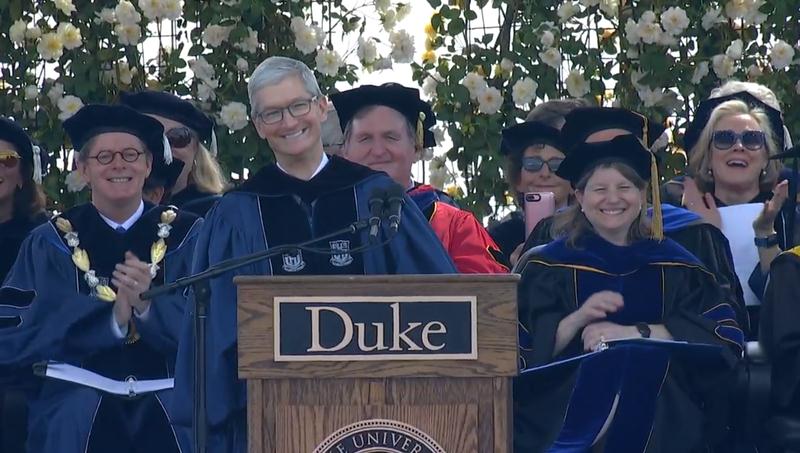庫克強調(diào)科技業(yè)隱私問題,,暗諷Facebook

|
5月13日,,蘋果公司首席執(zhí)行官蒂姆·庫克在獲得工商管理學碩士(MBA)學位的杜克大學發(fā)表了畢業(yè)典禮演講。他借機重申,,雖然其他科技企業(yè)未能處理好隱私問題,,蘋果仍然努力保護用戶隱私,也為該校教育做了宣傳,。 演講開頭,,庫克闡述了硅谷圈內(nèi)自我感覺良好的道德觀。他說:“在科技的幫助下,,人人都擁有工具,、潛力和影響力創(chuàng)造一個更美好的世界。我們生活在一個最幸福的時代,?!睅炜诉€回顧了蘋果的歷史,,鼓勵學生們緬懷蘋果創(chuàng)始人史蒂夫·喬布斯的同時也要“敢于追求新想法”。 庫克強調(diào),,蘋果沒有涉及近些年重創(chuàng)科技樂觀主義情緒的隱私問題,。他說:“有一種觀點認為,要充分利用科技就要犧牲隱私權(quán),,我們不同意,所以選擇了不同的道路,,收集用戶數(shù)據(jù)越少越好,,并且盡可能給予關(guān)懷和尊重。因為我們知道,,數(shù)據(jù)屬于用戶,。” 這席話很顯然暗指社交媒體巨頭Facebook,。近來Facebook因為數(shù)據(jù)分析公司Cambridge Analytica爆出的丑聞引發(fā)了公眾關(guān)注,,人們意識到社交媒體的風險不僅影響個人隱私,還關(guān)乎公共整體利益,。庫克最近一直抨擊Facebook,,但多年來蘋果確實相當重視隱私保護。早在2010年喬布斯就曾批評谷歌收集數(shù)據(jù),。硅谷知名風投機構(gòu)Andreessen Horowitz的合伙人本尼迪克特·伊文斯預計,,蘋果會繼續(xù)保持傳統(tǒng)。 預測:今年蘋果的全球開發(fā)者大會(WWDC)主題演講中,,如果提一次隱私你就喝一口飲料,,演講沒結(jié)束飲料肯定沒了。 ——本尼迪克特·伊文斯 但別以為庫克強調(diào)隱私是純粹利他,。蘋果和Facebook的業(yè)務(wù)有著本質(zhì)區(qū)別,。蘋果靠出售高端硬件獲利,而Facebook盈利則是靠在開放網(wǎng)絡(luò)上打廣告,。更適合與蘋果對比的可能是亞馬遜,。亞馬遜的平板電腦Fire售價不到蘋果平板iPad的一半,部分原因在于多個版本的Fire都能通過向客戶有針對性地投放廣告獲得補貼,。從這個角度看,,蘋果強調(diào)保護隱私也預示著,以后有能力支付更高成本的人才能擺脫數(shù)據(jù)追蹤,,如果不愿意花錢隱私就得不到保護,。 庫克在講話中含蓄地承認,將來確實可能出現(xiàn)更廣泛的社會不平等現(xiàn)象,?!澳銈兘邮芰耸澜缫涣鞯慕逃該碛猩贁?shù)人才能享受的機遇,。你們有獨特的素質(zhì),也就要承擔獨特的責任,,要開創(chuàng)更好的未來,。但并非易事,需要很大的勇氣,。勇氣不僅可以幫你們實現(xiàn)人生的意義,,也給你們力量改善他人的生活?!? 庫克說這些顯然是為了鼓舞學生,。但現(xiàn)在看來,所謂科技業(yè)領(lǐng)袖改善世人生活可能沒過去那么唬人了,。(財富中文網(wǎng)) 譯者:Pessy 審稿:夏林 ? |
Apple CEO Tim Cook gave the commencement speech on May 13th?at Duke University, where he earned his MBA. He demonstrated the quality of that education by leveraging the opportunity to remind the world of Apple’s commitment to user privacy—and other tech companies’ privacy failings. Cook’s speech,?opened with a version of Silicon Valley’s feel-good ethos. “Aided by technology,” Cook said, “Every individual has the tools, potential, and reach to build a better world. That makes this the best time to be alive.” Cook also gave nods to Apple’s history, urging students to “dare to think different” before offering a remembrance of Apple founder Steve Jobs. Cook also tried to distance Apple from the dark clouds that have sullied that techno-optimism in recent years. “We reject the excuse that getting the most out of technology means trading away your right to privacy. So we choose a different path, collecting as little of your data as possible, [and] being thoughtful and respectful when it’s in our care. Because we know that it belongs to you.” That seems most obviously a shot at Facebook. The social media giant’s recent Cambridge Analytica scandal seems to have finally woken the public up to the risks social media poses not just to individual privacy, but public discourse as a whole. Cook has been unrelenting in his criticism of Facebook recently, but Apple has placed a high priority on privacy for years. Steve Jobs even took shots at Google’s data collection back in 2010—and Andreessen Horowitz partner Benedict Evans predicts that the emphasis will continue. Prediction: if you have a drink every time Apple mentions privacy at this year’s WWDC keynote, you won’t make it to the end. — Benedict Evans But don’t mistake Cook’s words for pure altruism. Apple is in a fundamentally different business than Facebook, making profits by selling high-end hardware, instead of advertising on an open-access network. A more direct contrast might be with Amazon, which sells Fire tablets that cost less than half as much as an Apple iPad—in part because many versions of the Fire are subsidized by delivering targeted advertising. From that perspective, Apple’s focus on privacy portends a future in which some people can afford to escape digital tracking, and others can’t. Cook implicitly acknowledged the broader social context of rising inequality that could lead to that future. “The world-class education you’ve received . . . gives you opportunities that few people have. You are uniquely qualified, and therefore uniquely responsible, to build a better way forward. That won’t be easy. It will require great courage. But that courage will not only help you live your life to the fullest, it will empower you to transform the lives of others.” That passage was clearly intended to be inspirational—but the idea of tech leaders trying to transform other people’s lives may now be less dazzling than it once was. |













